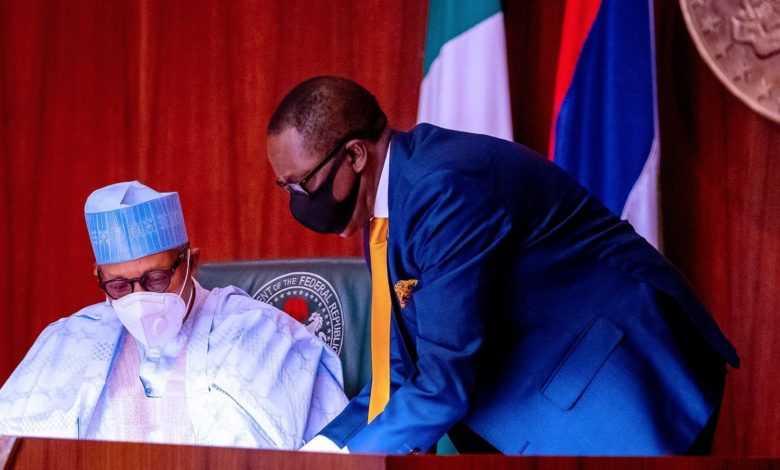Nigerian President Orders Security Chiefs To Take Out Terrorists, Kidnappers, Sponsors
Nigerian President, Muhammadu Buhari, says he is worried about the growing insecurity in the country, challenging the country’s security chiefs to rise to the occasion.

Amid worsening insecurity in Nigeria, President Muhammadu Buhari on Tuesday ordered his security chiefs to “take out” terrorists, kidnappers, and their sponsors, the National Security Adviser said.
The President’s latest call is one of the numerous orders he had given in the past as he faced criticism for his handling of attacks across the country, especially the terror campaigns by Boko Haram/ISWAP insurgents in the Northeast, the maiming and mass abductions by motorbike-riding criminal gangs in the Northwest and attacks on police officers in the Southeast and South-south.
Attacks on rural communities by terror gangs operating from the forests straddling the Northwest and North-central regions have escalated since January 2020, according to Amnesty International.
Earlier this month, the United Nations said the violence forced 77,000 people to flee to neighbouring Niger.
The criminal gangs, known locally as bandits, have also targeted schools. Between Dec. 2020 and now, more than 700 students have been abducted, injured or killed in a series of coordinated attacks on schools by terror gangs.
On March 11, they abducted 39 students of the Federal College of Forestry Mechanisation in Afaka, Kaduna state, a few days before the president had issued a two-week ultimatum to the new service chiefs to take out the criminals.
But in a video released after the abduction, the terrorists were assaulting the traumatised students with AK-47 pattern assault rifles.
Their growing influence has continued to raise concerns for Nigeria whose security forces have had to contend with a spike in Boko Haram/ISWAP militants’ strikes in the Northeast.
“Mr President has warned that the reign of terror unleashed on parts of the country by bandits and kidnappers is no longer acceptable,” the NSA, Babagana Monguno, told reporters after Buhari’s meeting with the security chiefs in Abuja, the country’s capital on Tuesday.
Buhari had repeatedly said his administration “will not succumb to blackmail by bandits” seeking ransom payments.
Earlier in Feb., the President appointed the four service chiefs, the first time in six years since he came to office in 2015.
On Tuesday, the President told the service chiefs that the armed forces must be more proactive rather than reactionary.
The President also directed that all the decisions approved at the national security council meeting in February be enforced. The decisions include a ban on mining activities in Zamfara and the no-fly order imposed on the state.
According to Monguno, “the president said the status quo should be maintained in Zamfara, so as to curb insecurity in the state.”
The meeting with the service chiefs comes ahead of Buhari’s medical trip to London, United Kingdom.
Support Our Journalism
There are millions of ordinary people affected by conflict in Africa whose stories are missing in the mainstream media. HumAngle is determined to tell those challenging and under-reported stories, hoping that the people impacted by these conflicts will find the safety and security they deserve.
To ensure that we continue to provide public service coverage, we have a small favour to ask you. We want you to be part of our journalistic endeavour by contributing a token to us.
Your donation will further promote a robust, free, and independent media.
Donate HereStay Closer To The Stories That Matter




